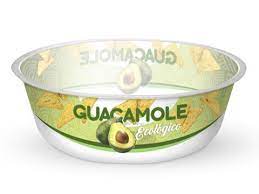
The system produces transparent flexible packaging that reduces wall thickness by 15% compared to other injection moulded containers – optimizing the weight of the pack and the amount of raw material needed to produce it.
Initial industrial tests have reportedly achieved high performance and efficient energy use by reducing the injection cycle by up to 10%. Up to 30% recycled food-grade PET can be utilized, the company continues – helping customers align with legislation across Europe.
Containers produced with TWI-PET can also feature IML decoration with labels made of PET or PP, both of which are said to be recyclable. The resultant packaging is set to apply to dairy products, nuts, dried food, sweets, and other food that requires highly transparent, heat-sealed, and high-barrier packaging.
The technology made its debut at Fakuma 2023 – as did a lightweight, thin-wall, injection compression moulded polypropylene cup from Netstal.
Earlier this year, ITC Packaging’s Bio2Bio bioplastic solution was implemented into its blow-moulded container portfolio for the food and cosmetics markets.
PulPac has also launched PulPac Scala, a new machine platform combining its Mill-to-Web fibre unit with injection moulding technology for Dry Molded Fiber.






